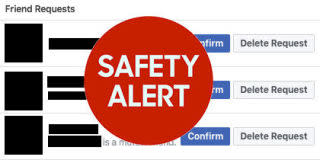Safety Alert: Don't Fall for This Facebook Friend Scam

If you get a Facebook friend request from an old friend, it may be reason to be wary. According to CBS SF, a man by the name of Michael Duane Hansen was nearly scammed out of hundreds of dollars after a crook posed as an old high school "friend."
After accepting the so-called friend's request, Hansen allegedly received a message asking if he had collected his $70,000 in stimulus money. The scammer claimed that he had gotten his money and saw Hansen's name on the list of people who are eligible to receive.
After texting the number that his "friend" gave him, he was told he would need to send $850 to get his check. Hansen immediately recognized that this was a sign of a scam, but then the number called him.
The person claimed they were from Facebook and said that Hansen could avoid the fee if he allowed him to take remote access of his computer. Knowing this was another red flag, Hansen refused, but not without some push back.
"He said I would lose the money. And I said, 'Then I guess I'm broke,'" Hansen told CBS SF.
Hansen was lucky that he recognized the signs of this fraudulent behavior, but the Better Business Bureau says that scammers are working on ways to trick even the most savvy Facebookers.
"We always warn users to be careful with what they share online, and social media sites are no different. Scammers will look for new ways to take advantage of users, even going so far as to pose as people you know," said Jessica Kapcar, Communications Manager at BBB serving Central Ohio in a news release.
They recommend doing the following to avoid being a victim of a scam:
Be wary of accepting friend requests from people you don't know.
Before accepting a friend request from a stranger, check out their profile. A recently created page with little or no posts or other information may be a fake.
Be cautious when accepting friend requests from someone you thought you were already friends with. Many times scammers create a false version of a friend or family member's profile to try to gain personal information. If you see a request from someone you are already friends with, contact that person directly and let them know there may be an issue with their account.
Never wire money, provide debit or credit card numbers, or prepaid debit card identification numbers to someone you don't know!
Report any fake profiles and fraud attempts to Facebook. You can do this by clicking on the three dots at the bottom right corner of the profile's cover photo.
File a complaint with the Internet Crime Complaint Center at ic3.gov.
If you have been targeted by one of these scam, share as many details as possible on BBB Scam Tracker at bbb.org/scamtracker.
Facebook is a great resource for connecting with old acquaintances, but Hansen's story is a lesson to always been mindful of who you are actually talking to.
You Might Also Like
